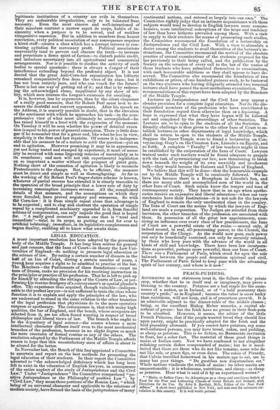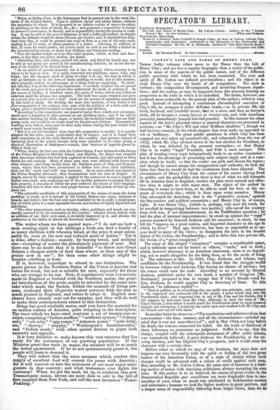PEACE-PUDDING.
ACCORDING as our statesmen treat it, the failure of the potato crop, whether that be in itself real or imaginary, may prove a blessing to the country. Potatoes are a bad staple for the suste- nance of a nation, as in Ireland, or of " a bold peasantry their country's pride," as in England ; because the tuber is more bulky than nutritious, will not keep, and is of precarious growth. It is an admirable adjunct to the dinner-table of the middle classes ; being, as the excellent Bishop Heber remarks, a capital ab- sorbent of grease : but the Irish have no grease in their flesh-pots to be absorbed. However, it seems, the advice of the little French Princess, that if the people wanted bread they should live upon pastry, might be practically adopted for the Irish and the bold peasantry aforesaid. If you cannot have potatoes, say some well-informed persons, you may have bread, cakes, and pudding, as cheap as potatoes. This is no fiction, no Barmecide invitation to feast, but a sober fact. The material of those good things is maize or Indian corn. Now we have confessed to not altogether relishing certain dishes compounded of maize ; but be it recol- lected that there are those who do not like tomatas, some who do not like eels, or green figs, or even dates. The cakes of Picardy, that Calvin travelled homeward in his mature age to eat, are to many but poor things. " De gustibus non disputandum est." Whole nations vindicate the relish of maize : its other merits are unquestionable : it is wholesome, nutritious, and cheap—as cheap as potatoes. Hear what is said of it by an experienced writer.* • "Maize, or Indian Corn; its Advantages as a cheap and nutritious Article of Food for the Poor and Labouring Classes of Great Britain and Ireland; with Directions for its Use. By John S. Bartlett, M.D., Editor of the New York A :biota." A slwrt tract published in New York, and sent over for extensive cir- culation in this country. It is well worth perusal. Maize, or Indian Corn, is the farinaceous food in general use in the rural dis- tricts of the United States. Upon it children thrive and adults labour, without the assistance of wheat. It is prepared in an infinite variety of ways—in cakes, in puddings, in the form of bread, 80c., &c.; and possesses a superiority to barley in powers of sustenance, in flavour, and in expansibility daring the process of cook- ing. It can be sold at the port of shipment at half a dollar per bushel; its freight across the Atlantic would be about 18 cents per bushel; and, if admitted into Eng- land duty free, it could be ground into meal or flour at a cost of Gi cents more, making in all 76 cents, or tquarters of a dollar. Allowing, in addition to this, 25 cents for retail profits, the article could be sold at one dollar a bushel in the manufacturing towns, or about four shillings and fourpence sterling.
"Now the bushel weighs at least fifty-eight pounds, which, at four and four- pence, is less than one penny sterling per pound. "Admitting then, that maize, ground into meal, and fitted for family use, can be sold at one penny per pound in the manufacturing districts, let us see the ex- tent of the benefits to be derived from it.
"As an article of general domestic use it has no equal, where economy is an object to be kept in view. It is easily. converted into puddings, cakes, rolls, and bread; but the cheapest mode of using it—that is to say, the way in which it i will go farthest—is in the form of hasty pudding or mush; and in this manner, when properly cooked, its advantages as a cheap food are surprising. To estab- lish this fact, I made the following experiment: I carefully weighed out one pound of the meal, and gave it to a person who understood the mode of cooking it. In the course of boiling, it absorbed about five pints of water, which was added at intervals until the process was complete. The bulk was again weighed and gave as a result four pounds and a ha?f. Such are the powers of expansion possessed fthis kind of grain. On dividing the mass into portions, it was found to fill ur soup-plates of the ordinary size; and, with the additicn of a little milk and sugar, gave a plentiful breakfast to four servants and children. According to this experiment, one pound of maize flour, which cost one penny, would give a breakfast to four persons at one farthing each; and if we add to this another farthing for milk, sugar, or butter, the breakfast would cost one half- penny each, and would be an ample meal for females and children. Thousands of working men, indeed, have gone to their daily labour during the past winter with a-much more scanty breakfast. "But it is not for breakfast alone that this preparation is useful; it is equally adapted for the other meals, particularly that of supper; and it is found from daily experience in all the rural districts of this country, that persons, instead of becoming tired of the article, become daily more attached to it—thus giving a physical illustration of Shakspere's remark, that 'increase of appetite grows by what it feeds on.'
" When, during the last war with the United States, I was intrusted with charge of the Prison Hospital at Melville Island, near Halifax, the Depot was crowded with American soldiers who had been captured in Canada, and sent round to Nova Scotia for safe custody. Many of these poor men were afflicted with fevers and other diseases; • and being mostly from the Northern parts of Ohio and Pennsyl- vania, where they had been accustomed to Indian corn from their childhood, their cry for mush and milk' was incessant. As no such article was issued in the Prison Hospital allowance, their lamentations took the tone of despair. At length, moved by their complaints, I applied to the contractor to send a supply of Indian corn meal; and, employing one of the healthy prisoners to prepare the ar- ticle properly, I soon placed before the poor sufferers the object of their longings. I mention this fact to show how fond people become of this article of food by con- stant use.
"The palatable auxiliaries of this preparation of the maize—I mean the hasty pudding, or mush, as it is termed in the United States—are sugar, molasses or treacle, and butter; but the best and most healthful by far is milk; a small quan- tity of which gives it a most agreeable flavour, and renders it highly digestible and nutritious.
"The other preparations, such as hominy, cakes, puddings, and bread, are con- stantly resorted to by all economists in the country: wheaten bread, indeed, with an addition of one third corn meal, is decidedly improved by it, and obtains the preference at the tables of almost all American families."
The writer whom we have quoted says—" I do not see how a man earning eight or ten shillings a week can feed a family of as many children with wheaten bread, at the price it must neces- sarily be, even at the new and reduced scale of duties." Yet it is done, after a fashion ; namely, by buying bread, and nothing else—excepting of course the peremptory payment of rent. But there can be no doubt that it is desirable " to throw into Great Britain a cheaper article of food than wheat, or than any of the grans now in use"; for then some other things might be bought—clothing at least. It is, however, important to attend to one distinction. The maize grown in the Northern States of the Union is heavier and better for stock, but not so suitable for men, especially for those who are strange to its use. Now, if experiments were extensively made in England or Ireland with the Northern maize, the gene- ral introduction of the grain might be retarded by the same mis- take which made the Scotch, within the memory of living per- sons, confound their ill-grown watery potatoes with the root so much praised in England, and refuse to adopt it. English mer- chants have already sent out for samples, and they will do well to make their correspondents attend to this distinction. Bring but good available maize, and you have the material for an endless variety of dainties, quite tempting in the description. The tract which we have cited contains a set of twenty-one re- ceipts, comprising "Indian muffins," "artificial oysters," "Johnny cake," " ash cake," "egg pones," " common pones," " corn dodg- ers," " shovey," " slappey,'f " Washington's breakfast-cake," and "Indian mush," with other quaint devices to pique both curiosity and appetite.
It is very desirable to make known this vast resource that lies ready for the sustenance of our growing population. If the Minister grant free trade in maize, the measure will be so much the better appreciated. If he do not spontaneously grant it, the people will learn to demand it. They will reflect that the same measure which confers this supply of excellent food will cement the peace with America ; for it will convert us into the customers of our most eager anta- gonists in that country; and what tradesman ever fights his customer? When we get the meal, let us, to celebrate this new Transatlantic union, invent one more dish to add to the bill of fare supplied from New York, and call the new invention " Peace- Pudding.



























 Previous page
Previous page